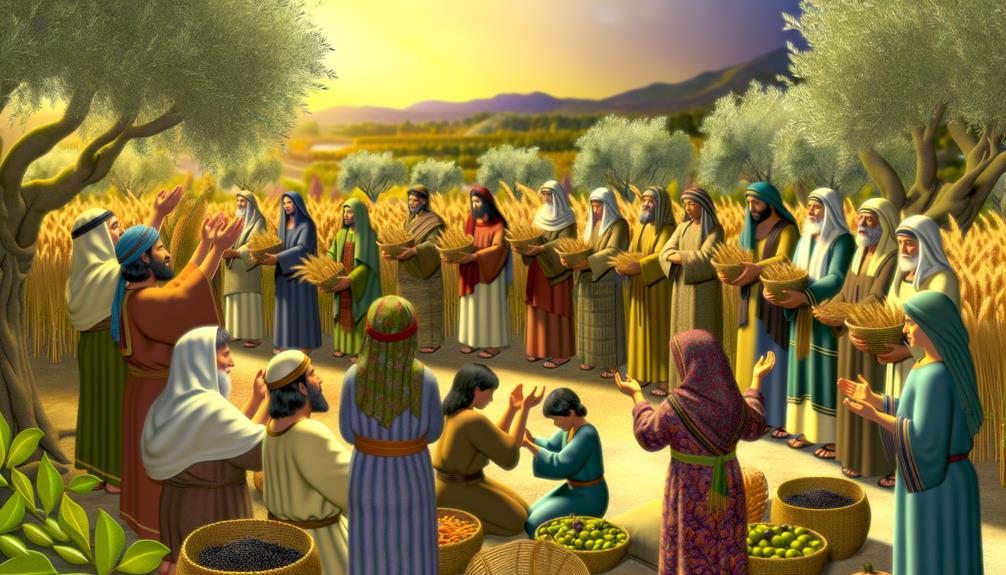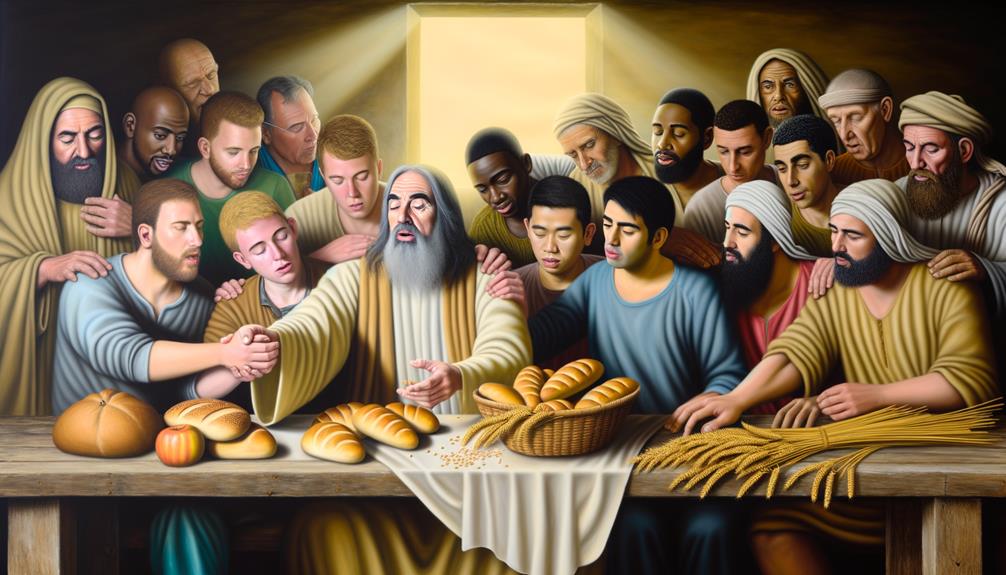Meaning of Thanksgiving Day in the Bible: Faithful Gratitude
The concept of Thanksgiving in the Bible is deeply rooted in expressions of gratitude to God through prayers, sacrificial offerings, and communal feasts. The Old Scriptures emphasizes thank offerings and the Festival of Harvest as central practices (Leviticus 7:12-15; Exodus 23:16).
In the New Scriptures, Jesus exemplifies gratitude in various acts, such as the feeding of the 5,000 and the Last Supper (John 6:11; Luke 22:19). The Apostle Paul further encourages believers to give thanks in all circumstances (1 Thessalonians 5:18).
Exploring these traditions reveals a rich tapestry of spiritual and communal significance in biblical thanksgiving.

Thanksgiving Day in the Bible: Meaning and Spiritual Significance
| Aspect | Description |
|---|---|
| Definition | A day or act of expressing gratitude to God for His blessings and provision |
| Biblical References | Psalm 100:4, 1 Thessalonians 5:18, Philippians 4:6 |
| Key Themes | Gratitude, worship, joy, and acknowledgment of God’s goodness |
| Importance | Strengthens faith, fosters contentment, and honors God |
| Spiritual Practice | Offering prayers, singing hymns, and sharing blessings with others |
| Historical Context | Rooted in ancient Jewish festivals such as the Feast of Tabernacles |
| Practical Application | Reflecting on God’s blessings, practicing gratitude daily, and giving generously |
Thanksgiving in the Old Testament

Examining the concept of thanksgiving in the Old Scriptures reveals its integral role in the religious and cultural practices of ancient Israel. Thanksgiving was expressed through sacrificial offerings, prayers, and communal feasts, serving as a means of acknowledging divine providence and favor.
Key examples include the thank offerings (Leviticus 7:12-15) and the Festival of Harvest (Exodus 23:16), both emphasizing gratitude for God’s blessings. These practices reinforced social cohesion and spiritual devotion, fostering an environment where communal and individual acknowledgment of God’s benevolence was paramount.
The act of giving thanks was not merely ritualistic; it was an essential expression of faith, reflecting a deep-seated recognition of the omnipresent role of the divine in daily life.
Psalms of Gratitude

The Psalms of Gratitude serve as quintessential expressions of heartfelt thanks and reflections of divine praise within the biblical canon.
These poetic compositions provide profound insights into the ways ancient worshippers articulated their reverence and gratitude towards God.
Expressing Heartfelt Thanks
Psalms of Gratitude in the Bible offer profound insights into the ancient practice of expressing heartfelt thanks to God, illustrating the depth and breadth of human thankfulness.
These Psalms provide a structured approach to gratitude, characterized by:
- Acknowledgment of Divine Acts: Recognizing God’s interventions and blessings (Psalm 103:2).
- Personal Reflections: Sharing personal experiences of God’s goodness (Psalm 116:12-14).
- Communal Praise: Joining with others to magnify God’s name (Psalm 95:1-2).
- Commitment to Worship: Pledging continuous devotion and thankfulness (Psalm 34:1).
This structured articulation of gratitude not only reflects individual and collective acknowledgment of divine benevolence but also fosters a disciplined spiritual practice, enhancing one’s relationship with the divine.
Divine Praise Reflections
Reflections on divine praise within the Psalms of Gratitude reveal an intricate tapestry of spiritual expression, highlighting the multifaceted nature of thanksgiving in biblical texts.
The Psalms, particularly Psalms 100, 136, and 138, serve as exemplary models of gratitude, combining reverence, joy, and a profound recognition of God’s providence and mercy.
These texts underscore the covenantal relationship between God and His people, where thanksgiving is both a response to divine benevolence and a communal act of worship.
The Psalms’ lyrical quality and emotional depth offer a timeless template for believers, illustrating how gratitude permeates every aspect of spiritual life.
Thanksgiving Offerings

In the context of biblical traditions, Thanksgiving offerings, often referred to as peace offerings, were integral to the ritual practices in ancient Israel, symbolizing gratitude and fellowship with God.
These offerings are elaborated in Leviticus 7:11-15 and encompass several distinctive elements:
- Purpose: Expressing gratitude to God for His blessings and provisions.
- Procedure: Involving the sacrifice of an unblemished animal, offered voluntarily.
- Communal Aspect: Portions of the offering were shared among the priests and the offeror, symbolizing communal fellowship.
- Spiritual Implications: Emphasizing a heart of thankfulness and recognition of God’s sovereignty.
These offerings were not merely ritualistic acts but profound expressions of the worshippers’ devotion and acknowledgment of divine providence.
Jesus and Gratitude

Building upon the rich tradition of Thanksgiving offerings, Jesus’ teachings and actions further illuminate the significance of gratitude in the Christian faith.
Through parables and miracles, Jesus consistently highlighted thankfulness. In Luke 17:11-19, Jesus heals ten lepers, but only one returns to give thanks, underscoring the importance of expressing gratitude.
Additionally, Jesus’ frequent prayers of thanks, such as before feeding the 5,000 (John 6:11), exemplify a life rooted in gratitude. His thankfulness during the Last Supper (Luke 22:19) reveals gratitude even in the face of suffering.
These instances collectively reinforce that gratitude is not merely a ritualistic practice but an integral aspect of a devout life, fostering a deeper connection with God and community.
Paul’s Teachings on Thanksgiving

Paul’s teachings on thanksgiving, particularly his exhortations to ‘give thanks in all circumstances‘ (1 Thessalonians 5:18) and to express gratitude continually (Ephesians 5:20), underscore a profound theological principle.
He frames gratitude not merely as a response to favorable conditions but as an encompassing attitude rooted in faith.
This perspective invites an exploration of how thanksgiving functions within the broader context of Pauline theology and Christian practice.
Expressing Gratitude Always
The apostle Paul emphasizes the importance of continual thanksgiving as a fundamental aspect of Christian life, urging believers to give thanks in all circumstances as a reflection of their faith and trust in God’s sovereignty.
Paul’s teachings highlight several key aspects:
- Unceasing Prayer: Thanksgiving should be intertwined with constant prayer, fostering a perpetual state of gratitude (1 Thessalonians 5:17-18).
- Spiritual Maturity: Expressing gratitude consistently indicates spiritual growth and maturity (Colossians 2:6-7).
- Peace of Christ: Thankfulness contributes to the peace of Christ ruling in believers’ hearts, fostering unity within the body of Christ (Colossians 3:15).
- Witness to Others: A grateful attitude serves as a powerful witness to others, showcasing the transformative power of Christian faith (Philippians 2:14-15).
Paul’s teachings therefore weave gratitude into the fabric of everyday Christian praxis.
Thankfulness in All Circumstances
In his epistles, Paul underscores the imperative of maintaining a posture of thankfulness regardless of one’s situation, hence affirming the believer’s trust in divine providence and sovereignty.
Paul’s exhortation in 1 Thessalonians 5:18, ‘Give thanks in all circumstances; for this is God’s will for you in Christ Jesus,’ encapsulates this theological principle.
By encouraging gratitude amidst trials, Paul elevates thanksgiving as a profound act of faith, intrinsic to Christian living.
This counsel serves not merely as an ethical directive but as a reminder that divine purpose transcends human understanding.
Thus, thanksgiving becomes an expression of unwavering faith and an acknowledgment of God’s omnipresent grace, fostering resilience and spiritual growth among believers.
Thanksgiving in Daily Life

Integrating thanksgiving into daily life involves a conscious recognition of the myriad blessings and acts of grace that permeate our everyday experiences. This practice, rooted in biblical teachings, encourages believers to cultivate an attitude of gratitude that transcends mere tradition.
To implement this effectively, one might consider:
- Morning Prayer: Begin the day with a prayer of thanks, acknowledging God’s provision and guidance.
- Mindful Reflection: Throughout the day, take moments to reflect on specific instances of grace.
- Expressing Gratitude: Verbally express thanks to others, reinforcing a culture of appreciation.
- Journaling: Maintain a gratitude journal to document daily blessings, fostering a continual awareness of divine kindness.
This structured approach guarantees thanksgiving becomes an integral part of daily life.
Spiritual Benefits of Gratitude

Cultivating a spirit of gratitude yields profound spiritual benefits, fostering a deeper connection with the divine and enhancing overall spiritual well-being. Gratitude, as illustrated in the Bible, is more than an emotional response; it is a deliberate act of worship and acknowledgment of God’s sovereignty. By consistently practicing gratitude, believers can experience a transformation in their spiritual lives, marked by increased peace, deeper faith, and a more profound sense of purpose.
| Spiritual Benefit | Description |
|---|---|
| Inner Peace | Gratitude reduces anxiety and promotes calmness. |
| Strengthened Faith | Acknowledging blessings enhances trust in God. |
| Enhanced Purpose | Recognizing divine provision clarifies life’s meaning. |
This table encapsulates the holistic impact of gratitude on spiritual health, underscoring its importance in biblical teachings.
Thanksgiving and Worship

Thanksgiving in the context of worship serves as a fundamental expression of reverence and acknowledgment of God’s providence, deeply rooted in biblical tradition.
Scriptures emphasize the intertwining of thanksgiving and worship, illustrating how gratitude enhances spiritual connection. Key aspects include:
- Scriptural Mandate: Psalms frequently command believers to give thanks, linking it to worship practices (Psalm 100:4).
- Communal Worship: Early Christian gatherings integrated thanksgiving into prayer and hymns (Colossians 3:16).
- Sacrificial Offerings: Old Covenant rituals often involved thanksgiving sacrifices, signifying devotion (Leviticus 7:12-15).
- Christ’s Example: Jesus exemplified thanksgiving, particularly at the Last Supper, highlighting its sacred nature (Luke 22:19).
These elements underscore thanksgiving’s pivotal role in worship, fostering a deeper, communal faith experience.
Applying Biblical Thanksgiving Today

Drawing from biblical principles, contemporary believers can incorporate thanksgiving into their daily lives through practices such as prayer, communal gatherings, and acts of service.
Prayer, rooted in scriptural exhortations like Philippians 4:6, encourages a heart of gratitude amidst supplications.
Communal gatherings echo the early church’s collective worship and thanksgiving, fostering unity and shared blessings as depicted in Acts 2:46-47.
Acts of service, inspired by Christ’s teachings, translate gratitude into tangible expressions of love and kindness, aligning with the biblical mandate of loving one’s neighbor (Matthew 22:39).
Conclusion
To sum up, the biblical notion of Thanksgiving, deeply rooted in both the Old and New Scriptures, underscores a life of gratitude as an act of worship and spiritual growth.
From the psalms to Paul’s epistles, expressions of thankfulness serve as a cornerstone of faith, illustrating the multifaceted benefits of a grateful heart.
Therefore, embracing biblical Thanksgiving today is not merely a tradition but a profound practice, enriching one’s spiritual journey and fostering a deeper connection to the divine. This practice encourages gratitude for the blessings received, cultivating a heart that is open to recognizing the divine presence in everyday life. Furthermore, it allows individuals to reflect on the deeper meanings behind significant events, including those highlighted by the Christmas star symbolism in scripture, which serves as a beacon of hope and joy. By engaging in thanksgiving, one not only honors personal experiences but also aligns with the sacred narratives that shape the essence of faith.
The proof of the pudding is in the eating.






